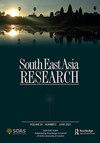辣椒农场和航空城之间:反对印尼日惹新机场的斗争
IF 0.9
3区 社会学
0 ASIAN STUDIES
引用次数: 0
摘要
摘要日惹国际机场于2020年8月28日启用,是印度尼西亚日惹特别地区现代史上最大的基础设施开发项目之一。虽然对一些人来说,机场项目证明了印尼政府承诺在该地区投资,对机场所在的泰蒙地区的农民来说,这代表着他们面临被驱逐和农田损失的威胁。因此,在2012年,Temon农民成立了一个名为Wahana Tri Tunggal的组织,开展反机场活动并保护他们的利益。不同意识形态背景的活动人士加入了农民的行列,他们一起继续抵制新机场的开发,直到2018年,他们最终决定结束这场斗争。本文通过对参与反YIA运动的农民和活动家的采访,描述了农民对他们在Temon的土地的依恋,以及他们拒绝向他们提供补偿的原因,反YIA斗争的多元组成,以及前参与者对该运动的回忆。本文章由计算机程序翻译,如有差异,请以英文原文为准。
Between chili farms and an aerotropolis: the struggle against the new airport in Yogyakarta, Indonesia
ABSTRACT Yogyakarta International Airport (YIA), which opened on 28 August 2020, represents one of the largest infrastructure developments in the modern history of the Special Region of Yogyakarta, Indonesia. While, for some, the airport project was proof of the Indonesian government’s commitment to invest in the region, to the farmers of the Temon area on which the airport now stands, it represented the threat of eviction and loss of their farmlands. Thus, in 2012, the Temon farmers formed an organization called Wahana Tri Tunggal to carry out anti-airport activities and protect their interests. The farmers were joined by activists of diverse ideological backgrounds, and together they continued to resist the development of the new airport until 2018, when they eventually decided to end the struggle. Based on interviews with farmers and activists who participated in the anti-YIA campaign, this article describes the attachment the farmers had to their land in Temon and the reason why they rejected the compensation package offered to them, the pluralistic composition of the anti-YIA struggle, as well as the recollections of the movement by its former participants.
求助全文
通过发布文献求助,成功后即可免费获取论文全文。
去求助
来源期刊

South East Asia Research
ASIAN STUDIES-
CiteScore
1.90
自引率
0.00%
发文量
42
期刊介绍:
Published three times per year by IP Publishing on behalf of SOAS (increasing to quarterly in 2010), South East Asia Research includes papers on all aspects of South East Asia within the disciplines of archaeology, art history, economics, geography, history, language and literature, law, music, political science, social anthropology and religious studies. Papers are based on original research or field work.
 求助内容:
求助内容: 应助结果提醒方式:
应助结果提醒方式:


